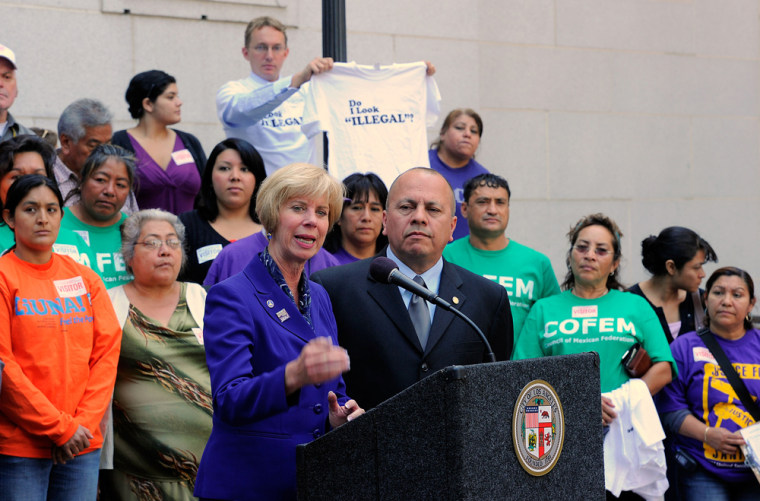Los Angeles on Wednesday became the largest city yet to boycott Arizona over its tough new law targeting illegal immigration in a move that likely will affect some $8 million in contracts with the state.
The City Council voted 13-1 to bar Los Angeles from conducting business with Arizona unless the law is repealed. The vote followed an emotional council discussion during which many members noted that their ancestors were U.S. immigrants.
Mayor Antonio Villaraigosa already has said he would approve the boycott.
“Los Angeles the second-largest city in this country, an immigrant city, an international city. It needs to have its voice heard,’’ Councilman Ed Reyes said, the Los Angeles Times reported. “As an American, I cannot go to Arizona today without a passport. If I come across an officer who’s having a bad day and feels that the picture on my ID is not me, I can be … deported, no questions asked. That is not American.’’
No new contracts
The resolution is expected to be signed by Mayor Antonio Villaraigosa. It bars the nation's second-largest city from conducting business or reaching new contracts with Arizona businesses unless the immigration law is repealed, and also prohibits most city business trips to the state.
Los Angeles has investments and contracts in Arizona worth as much as $58 million, much of which involve airport, port and energy service that can't lawfully be affected by the boycott. That leaves about $7.7 million in city contracts that could possibly be affected, said Councilwoman Janice Hahn, who co-authored the resolution.
Some of those contracts include helicopter services, Taser guns, waste management, engineering and surveillance equipment.
"Maybe some of those jobs and businesses could come back to L.A. and California," Hahn said.
The resolution claims that Arizona's new law encourages racial profiling and is unconstitutional. The law, set to take effect July 29, requires police enforcing another law to question a person about his or her immigration status if there is "reasonable suspicion" that the person is in the United States illegally and makes it a state crime to be in the country illegally.
Several lawsuits seeking to block its implementation are pending in federal court.
Some polls have shown strong popular support for the Arizona law, and critics are concerned that other states may follow up with their own versions.
Several cities have passed resolutions or urged boycotts to protest the law, including California cities such as Oakland and San Diego. A nonbinding resolution approved Tuesday by San Francisco city supervisors urges a boycott of Arizona-based businesses and asks sports leagues not to hold championship games or tournaments there.
'Pure rhetoric'
Arizona Gov. Jan Brewer said the boycotts are unfortunate and misguided, primarily because the law mirrors a federal requirement that legal immigrants carry immigration papers.
"It's already the law in the United States, and I have a responsibility to stand up and protect the people of Arizona and we will do that," Brewer said Tuesday.
Charges that the law will lead to racial profiling are "just pure rhetoric," Brewer said.
"I find it really interesting that we have people out there that are attempting a boycott in favor of illegal actions in Arizona. That to me is just unbelievable."
Of the resolution in Los Angeles, Hahn said: "We want to stand back and say that we're against it. We're hoping that Arizona will be the last state to do this instead of just the first state to do it."
Gerry Miller, Los Angeles' chief legislative analyst, issued a report before the vote recommending the council suspend travel, cut contracts and refrain from making any new ones with Arizona-based firms. He said the city's airport, port and utility companies are run by semiautonomous city agencies and the council cannot compel them to follow the boycott.
The council asked the city's lawyers to report back in a week on which contracts could be terminated without incurring lawsuits.
Hahn also called for a review of the city's investments and divestiture of any pension funds and bonds proceeds that could be invested in Arizona.
Councilwoman Jan Perry said the city should try to lure any organization considering holding a convention in Arizona to Los Angeles, while Councilman Richard Alarcon suggested offering Arizona businesses incentives to relocate to Los Angeles.
No one who attended the council meeting expressed opposition to the boycott resolution. Councilman Greig Smith, the lone dissenter, could not immediately be reached for comment.
Los Angeles staged a similar economic boycott against South Africa during apartheid and against Colorado after voters in 1992 passed a state law repealing local ordinances that banned discrimination against homosexuals.
Information from The Associated Press and Los Angeles Times is included in this report.
